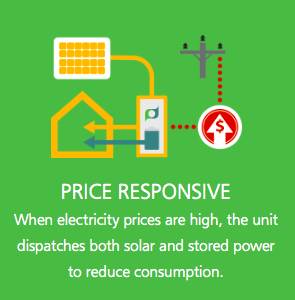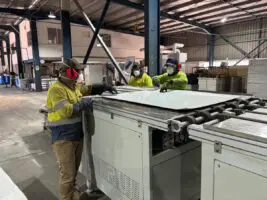Queensland regional network operator Ergon Energy is to launch its first major solar and storage pilot program that could be replicated across its network and for many of its 100,000 solar customers, particularly in remote areas.
Ergon on Thursday announced a deal with US solar giant SunPower and emerging battery storage solutions Sunverge to conduct a solar and storage trial in 33 homes in three Queensland towns.
While each home will be able to provide around 75 per cent of their needs through the solar and battery storage units, the real significance lies in how their output can be aggregated – help meet peak demand and overcome network constraints.
In short, it is significant but early step towards the changing shape of the energy market from the historical focus on baseline and peaking resources and vast networks, to one focused on decentralised, or localised generation and network management.
Ergon CEO Ian McLeod says Ergon is “looking to the future” with the deal with SunPower and Sunverge. The technology will allow solar power to be stored and put back into the grid when needed – such as at times of peak consumption.
“This is an important step towards more efficient ways to run electricity networks and also toward giving customers greater choice and control in how they manage their electricity needs,” McLeod said.
“We want to be at the forefront of these developments to increase customer service offerings and reduce investment into constrained areas of the network.”
The trials will take place in three towns – Toowoomba, Townsville and Cannonvale, just north of Cairns.
Each household will get 4.9kW of solar PV, and a Sunverge Solar Integration Systems (SIS) that comprises a 12kWh/5kW Sunverge battery storage and control system, which includes back-up power capability a 6kW inverter, along with on-board computing and cellular communications.
The assets to be installed in the households will be owned by Ergon, and the households will pay a monthly fee of around $89. Ergon estimates it will save households at least $200 a year, and more for larger energy users (see table below). Ergon will look after upkeep and maintenance.
The real breakthrough, though, comes in technology and smart software that allows the output from households to be stored, shared, and even traded on the energy market, and used to address issues such as peak demand.
In Cannonvale, where the network is “constrained” because of high demand and low network capacity, the trial will look to see how solar and storage can address those issues without building bigger and longer power networks.
Sunverge CEO Ken Munson told RenewEconomy that the systems they will install will allow the output to be traded, or dispatched to address demand issues or network issues.
The advantage of storage is that it can respond instantaneously, or within a second or two, whereas the current model of using gas or other peaking plants often takes minutes.
The traditional model is both expensive and slow, at least compared to these new technologies. Sunverge calls this a potential paradigm shift away from the traditional model of baseload and peaking power plants, to new models of “virtual power plants” or even “network clouds”.
“That is where the virtual power plant is exciting,” Munson said. “There are a lot of interesting point solutions out there with regard to technologies that provide self consumption, software applications, or one piece of the trading function.”
He said this approach, though, provides something very different: the full solution. “And from a technology point of view, we are fully scalable. We could roll out this solution to thousands of homes, aggregate those energy systems into a very large virtual power plant to assist in the retailers’ trading portfolio.”
Munson says these virtual power plants will help retailers in managing their financial risk (they often have to pay a lot to source energy at times of peak demand) and to manage, and mitigate costs, on their network.
That is the perfect outcome for Ergon, which is virtually unique in the National Electricity Market for being both a retailer and a distributor. Elsewhere, the vertical integration combines retailers and generators, with network operators being separate entities.
“Finding that value (for combined retailers and network operators and for consumers) is easier,” McLeod told RenewEconomy. This is the big trick for battery technology – less on its costs, more on its value and where it can be found. McLeod says that will be done by being consumer-centric and focussing on brining value out of the market.
“Having a material fleet of batteries that are smart and connected to control sectors is one of the key strategies into getting flat curves,” McLeod said. Those curves relate to load curves for networks, and pricing curves for retailers.
SunPower CEO Tom Werner said the technology would give homeowners a ‘Smart Energy’ solution that could deliver unprecedented levels of personalisation, value and control, and would likely serve as a model for similar programs around the world.
Indeed, Sunverge hopes that it will be replicated, and has indicated that there will be similar announcements happening in coming months.
Sunverge, also on Thursday, opened its Australian headquarters in Queensland. State energy minister Mark Bailey said the move showed it had confidence in the Palaszczuk government’s renewable energy vision.
“Labor is committed to one million (Queensland) solar rooftops by 2020 and it’s heartening to see a company from California pioneer a solar trial in a state known for its sunshine,” he said.
“Queensland is already one of the world’s highest per capita users of solar energy and we are delighted to be part of a program that is set to advance solar battery technology, and take the worries out of future electricity bills.”
Bailey said more than 100,000 homes in the Ergon network, and 400,000 across the state, now had solar panels on their roofs.
“The next big shift is combining this with batteries for home storage,” Bailey said. “This trial could see more solar batteries rolled out across regional Queensland.”
The project is being supported by the Australian Renewable Energy Agency (ARENA), which has contributed $400,000 towards it.
All of the systems are expected to be installed and operational by the end of this year.










